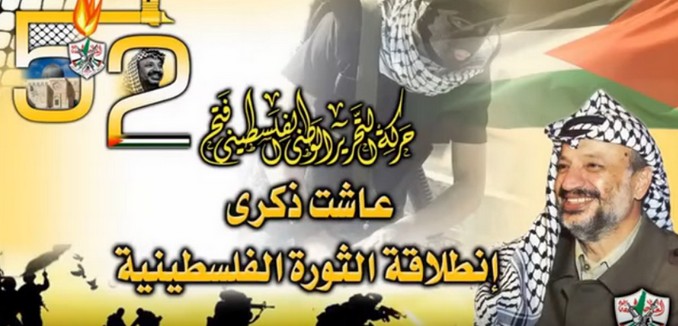Fatah, the political party led by Palestinian Authority President Mahmoud Abbas, celebrated the 52nd anniversary of its first attack against Israel last week in a series of Facebook posts glorifying Palestinian terrorists.
The party’s official Facebook page commemorated the January 1, 1965 attack by “parading some of the movement’s role models, among them several ‘Martyrs,’ all of whom were either murderers or heads of murderous terror organizations,” Palestinian Media Watch (PMW) reported.
The page shared a banner that describes “a real Palestinian” as someone who is “self-sacrificing fighter.”
“Fatah embraces its people and praises the Martyrs,” the banner reads. “A people whose leaders are Martyrs will undoubtedly triumph with Allah’s help.”
The banner also features the images of (right to left) Abu Ali Mustafa, the former secretary general of the Popular Front for the Liberation of Palestine; Sheikh Ahmed Yassin, the founder of Hamas; Fathi Shaqaqi, the co-founder of Palestinian Islamic Jihad; Yasser Arafat, the founder of Fatah; Omar al-Qassem, a member of Democratic Front for the Liberation of Palestine; President Abbas; and Dalal Mughrabi, a member of Fatah who led the 1978 Coastal Road massacre.
The massacre, which left 38 Israeli civilians dead — including 13 children — and 71 more injured, turned Mughrabi into a national hero among Palestinians, with multiple schools, buildings, and streets in the West Bank bearing her name. Fatah glorified her as a “Bride of Palestine” in a separate post on December 27th. Her portrait was featured prominently during a Fatah youth parade marking the party’s anniversary in Bethlehem.
Fatah also posted a picture of Palestinian children marching in military fatigues that was taken during an anniversary parade at the Nahr al-Bared camp in northern Lebanon.
PMW reported that other terrorists honored by Fatah during its anniversary celebrations included:
Arch-terrorist Abu Jihad who orchestrated attacks in which at least 125 Israelis were murdered; Marwan Barghouti, who is serving 5 life sentences for planning attacks that killed 5; Karim Younes, who kidnapped and killed an Israeli soldier; Raed Al-Karmi, who was responsible for attacks that killed 9 Israelis; Abu Ali Iyad, who was responsible for several terror attacks in 1966; Kamal Adwan, who was responsible for Fatah’s terrorist operations in Israel in the 1960’s and 1970’s and was a senior member of Black September.
Barghouti, who is serving five life sentences in an Israeli prison for his role orchestrating murders during the Second Intifada in the early 2000s, received the most votes for the Fatah Central Committee during elections this past December. Polls consistently show that he is one of the most popular Palestinian political figures.
In 1988, columnist Charles Krauthammer observed the significance of the Fatah’s first terror attack on January 1, 1965:
One of the tensest days of this round of violence occurred on Jan. 1, which Palestinians celebrate as the anniversary of the first attack on Israel by Fatah, Arafat’s leading faction of the PLO. It was 23 years ago that Fatah sent men to blow up the water works of Bet Shean. The anniversary was widely reported, but no one stopped to consider that 23 years ago was 1965.
In 1965 there were no occupied territories. In 1965 Jordan ruled the West Bank, Egypt ruled Gaza and not a Jew disturbed Islam’s third holiest site, Jordan having rendered the Old City of Jerusalem judenrein (free of Jews). None of the current pretexts for Palestinian violence even existed when Fatah began its war against Israel. The issue then as now was not Israel’s occupation but Israel’s existence.
The Six-Day War, during which Israel captured the West Bank and Gaza Strip, wouldn’t take place until June 1967, two and a half years after Fatah’s first attack.
Fatah routinely glorifies terrorists and violence on its social media pages. While celebrating the passage of an anti-Israel resolution at the United Nations Security Council last month, Fatah’s Facebook page posted a graphic of a knife stabbing through the Arabic translation of the word “settlements,” and what appears to a pool of blood underneath.
The party celebrated its 50th anniversary in 2015 with a graphic showing a Fatah flag billowing over a pile of skulls marked with Jewish stars.
[Photo: Politician Najat Ahmad / YouTube ]





